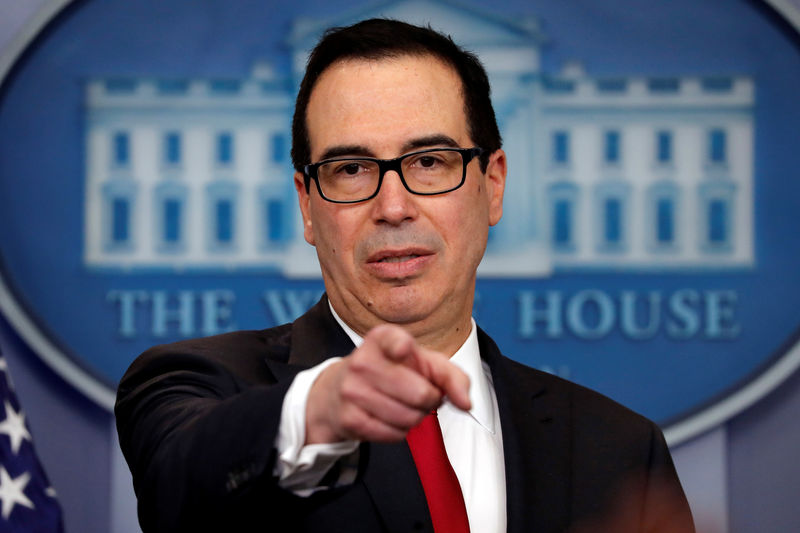By David Lawder
WASHINGTON (Reuters) - U.S. Treasury Secretary Steven Mnuchin said on Friday he believed the Republican tax cuts will ultimately become revenue neutral over 10 years due to higher growth, but the Treasury will likely ask Congress for more money to implement the plan.
"We think there will be over $1 trillion in growth, so I do think this will pay for itself," Mnuchin said at an event hosted by the Economic Club of Washington, dismissing estimates from the Joint Committee on Taxation that the tax cuts will increase U.S. deficits by $1.1 trillion to $1.5 trillion over 10 years.
Mnuchin said that for modeling purposes, the plan assumes 2.9 percent annual U.S. growth, but "we do think we can get to three percent or higher."
Mnuchin said the Treasury was talking to Congress about additional funding to aid implementation of the tax plan, which cuts rates for businesses and many individuals but significantly pares back deductions such as those for state and local taxes and mortgage interest.
"We will hire a significant number of people to help with the implementation," he said.
Mnuchin reiterated the need for Congress to raise the debt ceiling whenever the government gets close to its statutory borrowing limit. He added he did not believe Congress would allow the government to shut down when its funding authority expires on Jan. 19.
"I think it will either be resolved, or there will be another CR to extend this," he said, referring to a short-term 'continuing resolution' funding bill.
CRYPTOCURRENCY REGULATION
Asked about risks from cryptocurrencies such as bitcoin, which has seen a tremendous run-up in value in recent months, Mnuchin said the Treasury had formed a working group to monitor such currencies through the interagency Financial Stability Oversight Council.
His main concern was to keep criminal and terrorist organizations from using cryptocurrencies "to do bad things," he said.
Mnuchin said he would work with Group of 20 major economies to promote U.S.-style rules that require bitcoin issuers to know and vet their customers, similar to requirements for normal banks.
"One of the things we will be working with the G20 on is making sure that this doesn't become the Swiss numbered bank account," he said of cryptocurrencies.
Mnuchin said he was concerned about making sure that consumers fully understood the risks of investing in bitcoin.

Regarding central banks that are considering issuing digital currencies instead of physical currencies, Mnuchin said: "The Fed and we don't think there's any need for that at this point."